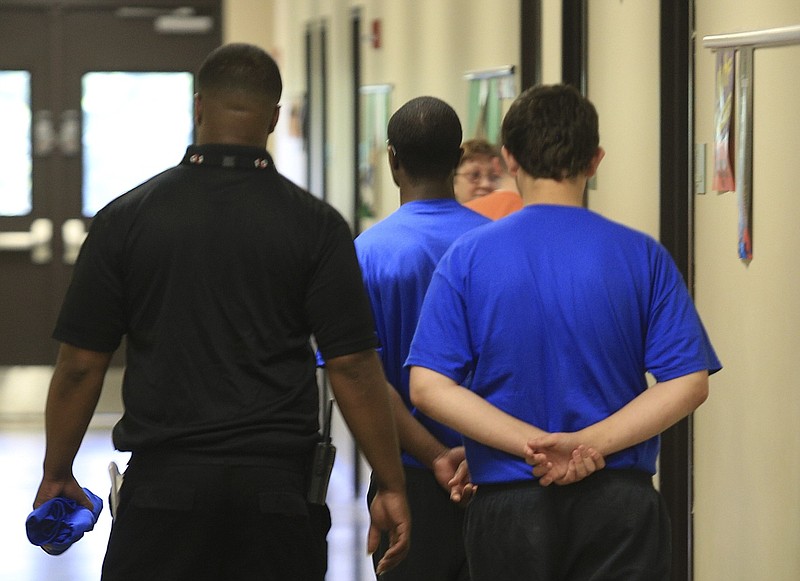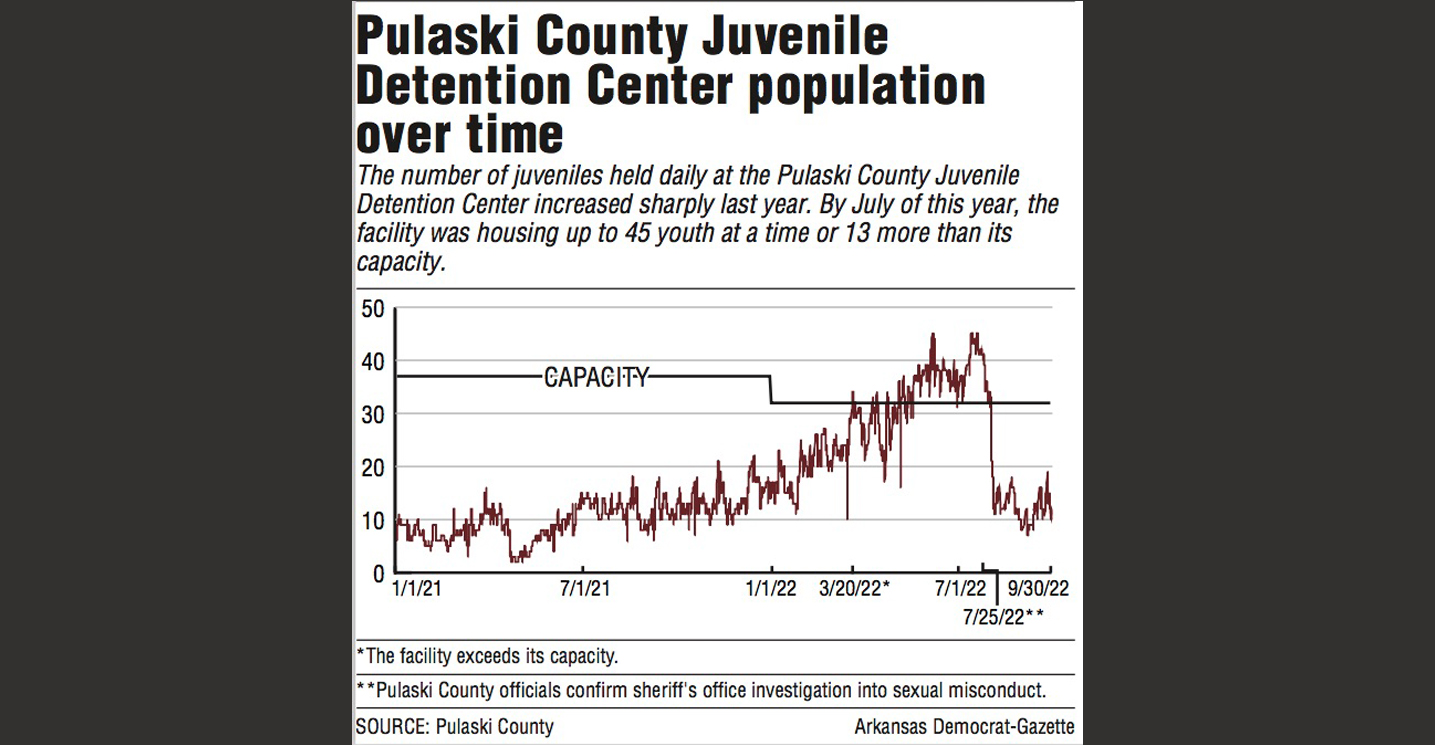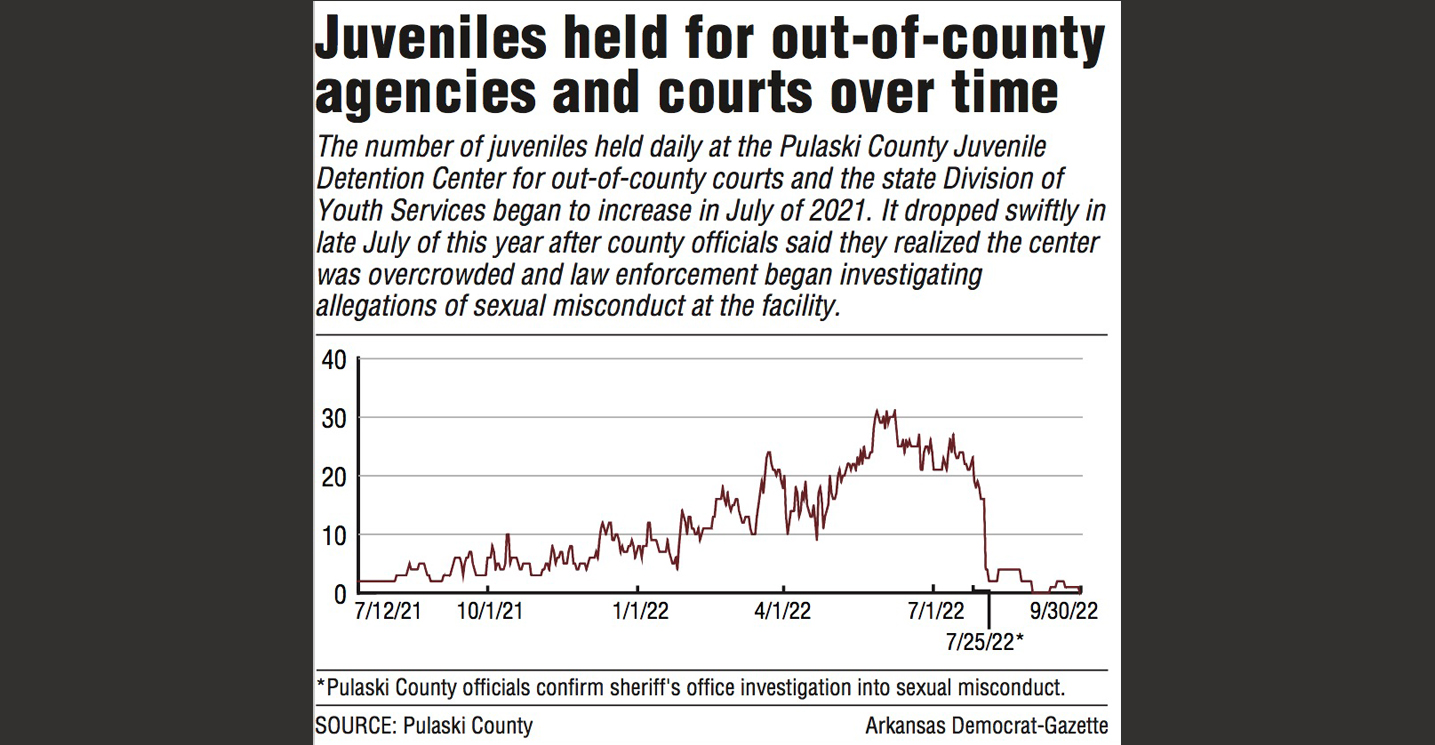A surge of incarcerated children from around Arkansas pushed Pulaski County's juvenile lockup beyond its capacity earlier this year, creating what a state inspector deemed dangerous conditions for detained youths.
The overcrowding came to light after allegations of sexual misconduct involving an employee at the facility. The Pulaski County sheriff's office opened an investigation into the misconduct claims in July. Around the same time, youths held for agencies and courts outside of Pulaski County were rapidly moved out of the jail.
The influx of children from outside of Pulaski County began in July 2021, according to jail census records obtained by the Arkansas Democrat-Gazette through an Arkansas Freedom of Information request. Within a year, records indicated the Pulaski County Juvenile Detention Center was housing up to 45 children a day -- 13 more than its capacity.
Jail staff attributed the spike to several factors including changes in a federal youth incarceration law, the effects of the pandemic on the criminal justice system and a general lack of space in Arkansas jails. With officials in other parts of the state struggling to find beds for children, administrators at the Pulaski County facility said they began accepting more transfers from courts outside of Pulaski County and the state Division of Youth Services.
After learning the facility was understaffed and overcapacity, Pulaski County administrators in late July and August "took immediate action to bring the facility back to capacity" by removing out-of-county children who were not held on a court order, county officials said in a statement.
MISCONDUCT ALLEGATIONS
As the jail's population peaked this summer, Brooke Digby, a juvenile ombudsman, raised concerns in an email to another state official that administrators were housing youths in unsecured areas of the facility and failing to provide proper bedding. She also alleged that staff was "overloading the facility beyond its rated capacity." Conditions at the jail, Digby claimed, had led to her receiving "multiple reports of sexual misconduct / rape by staff and youth."
"A lot of this information isn't being reported by JDC staff, is reported days late, or isn't being reported accurately," claimed Digby in a July 21 email to Brooke Steen, Juvenile Justice Division director for the Arkansas Administrative Office of the Courts, obtained through an Arkansas Freedom of Information request.
In a June 9 email sent to Ronald Routh, director of the juvenile lockup, Digby wrote she had heard some detained children were sleeping "in a day room on the floor without any type of mat."
"If this is true, this seems inhumane and not how my [Division of Youth Services] youth should be treated," Digby said.
Routh responded that staff provide children in the unit with blankets and 4-inch thick mattresses. Routh claimed many of the children decline to sleep on cots offered by the facility.
"We do have cots, yet almost 100% do not like the cots and would rather not use them. This is not uncommon because a lot of the residents inside a 2-3 person room would rather sleep on their mats on the floor," said Routh in a June 10 email to Digby.
Routh said the children in the room had access to showers and a private bathroom.
Rodney Shepherd, deputy director of the Pulaski County Juvenile Detention Center, said in an early November statement to the Democrat-Gazette that the facility provides each youth with a sleeping mat. When bunks are not available, staff members offer children cots on which to place their mats.
The facility has housed children in two rooms that did not have immediate access to a bathroom, according to Shepherd. To use a toilet, Shepherd said youths in these rooms had to notify a detention center employee who could take them to the staff restroom. Shepherd clarified in a follow-up request for comment that staff members were available to escort children to the restroom. Youths in these rooms had access to coolers with ice and water, Shepherd said.
Existing juvenile detention facilities must provide all rooms with access to an above-floor-level toilet, a wash basin, shower facilities and an above-floor-level bed, according to standards used by the Arkansas Department of Correction's Review Committees.
CHANGES AT THE JAIL
Before the surge of detainees, administrators restructured parts of the detention center to ensure compliance with standards. The renovations included removing bunk beds which Shepherd said made the facility safer but dropped its capacity from around 37 to 32.
Shepherd said the facility stopped accepting requests to hold out-of-county juveniles in August. This decision came after the detention center exceeded the 32-inmate capacity for several weeks in 2022, according to census records. He said the facility tries to maintain a ratio of six juveniles per staff member.
When asked why the facility did not act sooner, Shepherd said in a statement county officials acted as soon as they learned the facility was understaffed and overcrowded in August.
"The safety and well-being of children is a top priority to the administration of Pulaski County, and the juvenile detention center is no longer accepting out-of-county residents," said Shepherd. "Focusing on serving Pulaski County's youth permits us to best ensure the safety and well-being of residents in the juvenile detention center."
Pulaski County Judge Barry Hyde said in a Nov. 7 email statement he first learned the facility was over capacity the week of July 25.
"I immediately ordered a reduction in out of county residents to bring us back within capacity," said Hyde. "We were under capacity by Aug. 2."
As of the latest available figures on Nov. 7, the facility was housing 11 juveniles.
Four days after Digby sent her July email raising concerns about conditions at the facility, Kristin Knox, spokesperson for the Pulaski County sheriff's office, confirmed the office had opened an investigation into allegations of sexual misconduct.
Pulaski County officials said the sheriff's office received a report from the Arkansas State Police alleging an employee had committed sexual misconduct. The employee was placed on paid administrative leave while the claims were under investigation.
As of Nov. 21, the sheriff's office had turned the findings of their investigation over to the prosecuting attorney's office. Law enforcement officials are waiting to hear whether attorneys would press charges, Lt. Cody Burk, spokesman for the agency, said.
Shepherd declined to answer questions related to the sexual misconduct allegations or the Pulaski County sheriff's office investigation into the reports during an Oct. 5 interview.
County officials said they were unaware of any allegations of rape at the juvenile detention center before learning of Digby's email.
"The Arkansas Democrat Gazette's report is the first the County is learning of these allegations. State agencies having such information should have notified the County administration immediately to permit a swift and certain response to ensure the safety of our residents," county officials said in a statement provided by spokesperson Madeline Roberts.
Digby wrote in her July 21 email that she asked Gary Glisson, an administrator with the Crimes Against Children Division of the Arkansas State Police, "if it was okay for us to send this email." Digby wrote Glisson said "it would not be a problem" to send the message mentioning the rape allegations.
State law bars Arkansas State Police from acknowledging whether the Crimes Against Children Division has ever been involved in the investigation into the juvenile detention center. Local law enforcement had not requested State Police to open an investigation through its Criminal Investigation Division, Bill Sadler, spokesman for the agency, said on Nov. 21.
JUVENILE INMATE SURGE
Shepherd speculated that recently enacted federal standards may have driven some of the surge in incarcerated children the facility saw in 2021 and 2022.
Adult jails were barred from detaining children charged as adults without a court order starting December 21, 2021, by the federal the Juvenile Justice Reform Act of 2018. The act also prevented children charged as adults from having sight or sound contact with incarcerated adults without a judge ruling it was in the "interest of justice" to do so.
To remain in compliance with the act, adult jails would have had to transfer any youths without necessary court orders to facilities allowed to hold minors.
Finding beds for children charged as adults can be more difficult than placing ones facing lesser charges, said Holly Foster, director of the Benton County Juvenile Detention Center. This means counties with already limited resources may have had to search farther afield for places to house youths pulled out adult jails after the provisions of the reform act went into effect.
"I'll say I'm much more selective if someone approaches me with an adult-charged kid," she said on Oct. 19.
Shepherd said the strain the coronavirus pandemic placed on lockups in smaller counties may have also contributed to the increase in youths at the Pulaski County facility. Delays in court proceedings caused by the pandemic created a backlog of cases that worsened inmate crowding in jails across Arkansas.
"The [Pulaski County Juvenile Detention Center] director started taking juveniles from other counties in order to help alleviate that problem," Shepherd said. "So, yes, it kind of got to where we had more kids than we needed here."
After the start of the pandemic, Foster said she saw more counties asking if her facility had availability. She said coronavirus procedures limited bed space and facilities suffered from staffing shortages. When deciding whether to accept children from other counties, Foster said she was always mindful of staying under her center's capacity. She noted, however, this could mean turning down counties that were in need of a place to house children.
The Division of Youth Services likewise attributed the spike in youths in the criminal justice system to court delays.
"We believe the uptick is tied to courts fully reopening after being closed or reducing operations during the pandemic and working through backlogs," said Gavin Lesnick, spokesman for the division in an emailed statement.
The Division of Youth Services began sending more children to the Pulaski County facility after seeing an increase in commitment numbers in March through June. While the agency worked to increase the capacity of its intake unit, the state nevertheless had to send more children to juvenile detention centers to await assessment. At the time, the division's primary juvenile detention facility in Jefferson County was nearing capacity which led state officials to send more youth to Pulaski County, said Lesnick.
Adding to these limitations, Shepherd noted that in recent months and years, other juvenile detention centers in Arkansas have closed, reducing the options for where courts could send incarcerated youth.
In addition to Pulaski County, there are 10 other juvenile detention centers in Arkansas, said Lesnick in October.
At least one Arkansas juvenile detention center has not seen a population spike related to the pandemic or changes in federal regulations. Christopher Tinsley, director of juvenile detention for Washington County, said in October that his facility did not see an increase in juveniles held for out-of-county courts or the Division of Youth Services last year. In email statement, Tinsley noted his facility charges outside counties $92 a day to hold their juveniles, which is $12 more than the Pulaski County facility.
YOUTHS MOVED OUT
In July, the state Division of Youth Services began moving children out of the Pulaski County facility citing the sheriff's office investigation in the sexual misconduct reports. The jail's census records indicate that children on hold for local courts were transferred out of the facility in large numbers in early August.
When asked why officials began rapidly transferring children out of the facility, Shepherd said the juvenile lockup lost several employees around that time. One employee was out on leave, three were out due to on-duty injuries and a couple had quit, according to Shepherd.
"We experienced a sharp loss in manpower," Shepherd said. "It came to a point where we had to remove some of the juveniles from the facility just to keep things safe here with the manpower that we have."
Shepherd declined to comment when asked if the investigation into the sexual misconduct at the facility led to the transfers.
While Shepherd said a few of the children at the Pulaski County lockup were transferred to facilities in Pine Bluff and Yell County, he wasn't sure where all the juveniles ended up.
"Basically, we called up the counties we were holding for and said we need you to come get these kids because we don't have the manpower to hold them," he said.
A chain of emails obtained by the Arkansas Democrat Gazette show officials with the state Division of Youth Services coordinated on the afternoon of July 22 to find alternative facilities for children housed at the Pulaski County facility.
In one email, Glenn Holt, deputy director of the division, indicated the children held in Pulaski County were in a queue "like the other 34 juveniles waiting in a [juvenile detention center]."
In response, Digby implored state officials to quickly move children out of the Pulaski County facility.
"Pulaski county is even worse. Kids are in danger of being sexually assaulted. ... I know we have kids who have waited longer than others on this list. But for me it's about keeping our kids safe and out of danger in these places," said Digby. "I don't care what order they came in as long as they are moved to safety."
State officials moved youth under their care "as soon as we could place them elsewhere once we learned about the allegations," said Lesnick in an email statement. Though the Division of Youth Services reached out to other juvenile detention centers, many of the youth held in Pulaski County were transferred to the Jack Jones Juvenile Justice Center in Pine Bluff, according to Lesnick.
The contract between Pulaski County and the Division of Youth Services has not changed since July. While the Division of Youth Services may use the facility in the future, there were no youths under the division's care at the Pulaski County facility as of Wednesday, said Lesnick.
When asked if the Division of Youth Services was aware that the Pulaski County facility had exceeded its capacity, Lesnick replied "[The division] always asks if a facility can take kids before sending them. When we first received word of possible inappropriate behavior, we also learned that the population was high. We started moving kids immediately."
Jail records showed courts in Saline and Sharp counties held children for many days at the Pulaski County facility in 2022.
Amy Gilbreath, a juvenile probation officer with Sharp County, said juvenile detention resources are strained across Arkansas. The closest youth lockup to her county is in Craighead County. The Pulaski County facility is the second-closest, she said during an interview in October.
While census records indicate Sharp County didn't house children at the Pulaski County juvenile lockup in 2020, Gilbreath said staff in Pulaski County didn't encourage herto begin sending youth to the Little Rock facility in 2021.
"I can't remember any time that the [Pulaski County] JDC reached out to me to drum up business," she said. "We have a list of [Juvenile Detention Centers]. I just go down the list and call."
When news broke about the sexual misconduct investigation, Sharp County had already moved its youths out of the Pulaski County facility, according to Gilbreath.
"Had we had some [children] in the facility, we would have removed them immediately," she said.
Information for this article was contributed by Teresa Moss of the Arkansas Democrat-Gazette.


